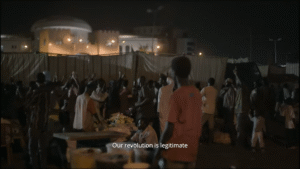It has been two months since the people in Sudan started a widespread protest against against corruption and for dignity, against the regime of al-Bashir who is running the country since he came to power with a military coup in 1989. At first, the western mainstream media focused on the spike of price of bread and oil as the motive behind the protests, which is not false, but it seems more accurate to put the various motives for the protests under the word “dignity”.
I was fortunate to watch a film from Sudan today at the Berlin International Film Festival where the film won the Documentary award as well as the Panorama Audience Award. This documentary greatly contrasts with the videos that circulate from the uprising in Sudan: it is calm, pensive, quiet, almost peaceful. It follows four elderly men who patiently try to come up with a plan in order to find a movie theater and show films to the public for free. We visit abandoned open cinema theaters with them where children play soccer in the empty building. We witness the patience of these men and their friendship. They go to the soccer field in the neighborhood where young boys are playing soccer. Four old men hand out a short questionnaire to the soccer players and their audiences, and conduct a quick survey on what type of film they would like to watch at a movie theater. Most of these boys have never seen a movie in a movie theater because movie theaters were shut down in years under the regime of al-Bashir. Cinema is a dangerous thing in Sudan. Gathering together is a dangerous thing.
These four filmmakers – Ibrahim Shadad, Manar Al Hilo, Suleiman Mohamed Ibrahim Elnour, Altayeb Mahdi – are members of the Sudanese Film Club and write letters to official agencies to receive permit to show films to the public, without issuing tickets or charging a fee. In their time, they had traveled abroad and received their education in cinema and film, had returned to Sudan and made films which were banned or lost. Suleiman Mohamed Ibrahim Elnour went to Moscow to study film and graduated from VGIK in 1978 with his project documentary film, Africa, the Jungle, Drums and Revolution (1979), about representations of Africa in Soviet society. Talking about Trees includes a short clip from this film as well as other films of these filmmakers, making this documentary an essay on the untold story of the Sudanese cinema as well as its film archive. Their life stories are underscored with the political episodes of Sudan; military coups, periods of democracy, uprisings, revolutions… We don’t learn their life stories. The film does not try to tell everything, teach everything that is to know about Sudan. We just watch. Patiently. Quietly. Just like we watch the documentary maker watch Elnour, who is watching the neighborhood from the abandoned outdoor movie theater’s roof as if he is making a movie with his eyes.
This film is a warm-hearted salute to the history of cinema. It is also a mediation on art, life, strife and endurance. It was a very humbling experience for me to watch these men going after their passion, patiently and diligently, with very little resources they have. They efforts to get a permit to screen movies to the public fail but we know this is not the end of their story.
At the award ceremony for the Panorama Audience Award, the director explained the source of the quote recited by one of the men in the film, which he brought the title: “talking about trees is almost a crime / for it implies a silence about such atrocities…” It is a poem by Brecht, translated into English as “To Those Who Follow in Our Wake” (An die Nachgeborenen). The man who recites the poem as they get ready to sleep on the roof of the cinema at night in the film told the audience of the story when he had run into the Arabic translator of the poem by coincidence. It is a poem on the futility of talking about things like trees, art, cinema, while great crimes are committed and there is so much suffering, explained the director. He went on to say that it was a poem pretty well-known in political circles in the past as well, such as within his family. (I found the German original and the English translation by Scott Horton in his exegesis of the poem here. And one Turkish translation of the poem is provided in this essay here.)
Sometimes the soil gets very dry and it seems nothing can grow out of it other than a blinding dust in the wind. “It is just dead dirt,” one often thinks. But the seeds that have traveled from a tree, or a poet, carried with that wind once upon a time and nested under the dirt may meet with the drops of water one patiently dribbles and germinates and grows towards the sun for others to see. They sometimes do. In the form of a poem, in the form of a song, in the form of a story or a chant. Then it is up to us to look back and “think upon” the first tree, or the poet, “with leniency”. “For conversing about trees is almost a crime, because in doing so we maintain our silence about so much wrongdoing!”

